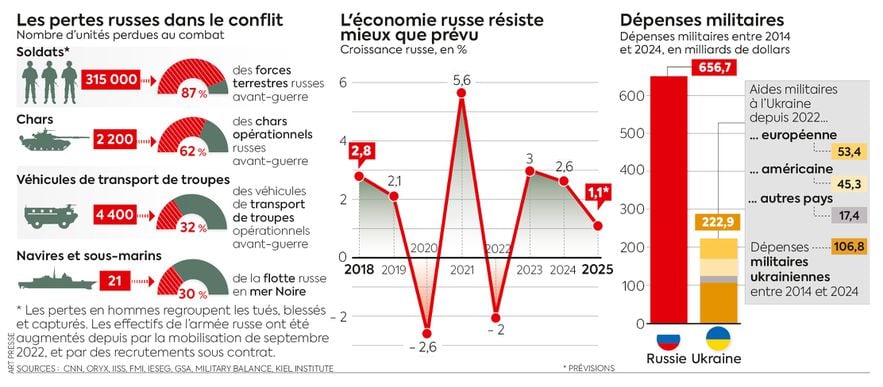It is rare to see Vladimir Putin smile. But this February 16, while visiting an arms factory in Chelyabinsk, east of the Urals, the Russian president appears surprisingly relaxed. And for good reason. That same day, in Siberia, the opponent Alexeï Navalny died tragically in the penal colony of Melekhovo, while in eastern Ukraine, Volodymyr Zelensky’s troops withdrew from the town of Avdiïvka. By displaying this façade of serenity, the Russian president wants to send a clear message: this is how those who oppose him end up.
However, let’s not fall into the trap. The situation in Russia is not as rosy as the Russian autocrat wants us to believe. Certainly, his army has regained the initiative. Taking advantage of the ammunition shortages of the Ukrainian forces, who quite simply no longer have the means to respond to the deluge of Russian fire. And the gloomy atmosphere which weighed on the Munich Security Conference on February 17 and 18 clearly illustrates Western concern on this crucial subject.
In what increasingly resembles a war of attrition, the outcome will indeed be decided as much in the arms factories as on the battlefield. The Russians understand this well. Nearly a third of the state budget will be dedicated to military needs in 2024. Many arms factories have worked three shifts, seven days a week. On the other hand, the Europeans are in disorganized order. And if the security pacts recently signed with kyiv by the German and French leaders go in the right direction, concrete results are still awaited. In short, Europe is slipping, the American Congress is blocking vital aid of 60 billion dollars, while Russia has gone into a war economy.
A weakened Russian army
However, you have to keep a cool head. The Russian army is not invincible. And the country’s economy is not thriving. Proofs ? On the military level, first. In two years, the Russian army has paid a heavy price: 315,000 men have been killed, wounded or taken prisoner, according to a recent declassified note from American intelligence. Some 2,200 tanks – two-thirds of the fleet – and more than 4,400 armored vehicles are out of commission. “These figures are colossal,” confirms Camille Grand, former deputy secretary general of NATO, now a researcher at the European Council for International Relations. In Afghanistan, the Soviet army had lost around fifteen thousand men in ten years .”
A Russia more weakened than it seems.
© / Art Press
Worse, some of the best units were destroyed. “The effort to modernize the army undertaken by Putin since the early 2000s has been largely annihilated,” adds Yohann Michel, researcher on defense issues at the International Institute for Strategic Studies. To compensate for its losses in armor, Moscow is drawing on its old reserves inherited from the Soviet era, notably T-62 tanks, designed in the 1960s. The country has, however, found allies. Its arsenal includes thousands of Shahed drones, produced by Tehran, but also shells and ballistic missiles from Pyongyang. “Russia has suffered heavy losses, but it could compensate for them in a few years,” summarizes Camille Grand. For Europeans, it is urgent to catch up.
The slow poison of economic sanctions
On the economic front, too, the situation is not brilliant, despite Putin’s ranting. Certainly, growth has not collapsed: it has even held up rather well, flirting with 3% in 2023 and 2024, according to the latest IMF projections. Moscow has been able to find new outlets, replacing its old European buyers with new customers in India, the United Arab Emirates and Africa. While oil prices remained high, Russian exports at the end of 2023 were close, in value, to their level at the end of 2019. However, economic sanctions are a slow poison that undermines the productive system. The decision by the West to block their exports of high value-added products has destroyed the Russian automobile and aeronautics industries. Of course, the net of sanctions is not completely watertight and China was able to satisfy part of the needs of its big neighbor: made in China represented almost 60% of total Russian imports between January and October 2023! But for semiconductors, measuring or navigation instruments, essential for the defense industry, Western sanctions weigh heavily on the military-industrial complex. In these sectors, Moscow would have only replaced a little less than half of the lost imports, according to the Bank of Finland Institute.
In reality, Russia’s growth potential is permanently weakened. Putin’s headlong rush into a war economy is not sustainable in the long term. Although it has little debt, the country no longer has access to international financial markets. He had to draw on his national wealth fund fueled for years by hydrocarbon exports. In one year, its value fell from 211 billion dollars to 133 billion! “The most liquid assets in this fund have already been used. That leaves gold and securities denominated in yuan, which are more difficult to use to finance the budget deficit,” notes Julien Marcilly, chief economist of Global Sovereign Advisory.
Should we now go further with sanctions? The question of the seizure of the 260 billion foreign currency reserves of the Central Bank of Russia arises. Just like the expansion of sanctions on Russian liquefied natural gas, of which France has become one of the major buyers. Or the establishment of so-called secondary penalties, which would prevent Western companies from purchasing from third countries any product made from Russian elements. Enough to dissuade Beijing from obtaining supplies from Russia, for fear of seeing the American and European markets closed. The West therefore still has assets. Let’s just stop procrastinating. “Don’t ask Ukraine when the war will end,” declared Volodymyr Zelensky last weekend in Munich. “Ask yourself why Putin is still capable of leading it.” The Ukrainian president knows it: in a war, time is sometimes as decisive as an armored division.
.
